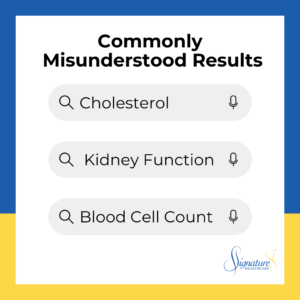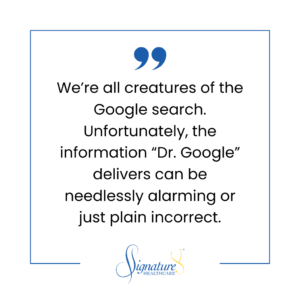Consulting Dr. Google? Talk to Us Instead
Your patient portal alerts you to a “new test result” — the lab results from your annual bloodwork. But when you review your numbers, you see something abnormal.
You Google what your numbers “should” be… but the more you probe, the more anxious you become. Do you have a terrible disease? Google seems to believe you do.
The Internet is a rich, rapid resource for just about any topic. But how accurate is the information Google provides? When it comes to your unique personal health, can you truly rely on what search engines say? Or are you better off having a reality check with a concierge physician who can interpret and explain your numbers?
Those Complex Lab Reports
For the average patient, reading and processing the jargon and data in a lab report is like deciphering a foreign language. Without a medical background or explanation from a professional, you have no idea what you’re looking at.
When a patient undergoes a series of medical tests, several resulting parameters are likely to be at least slightly out of the recommended range. And if you see a parameter flagged as “too high” or “too low,” you may feel immediate stress and anxiety.
Those worries can increase when “Dr. Google” confirms your fears. In 2022, nearly half of all American adults (46.1%) used the Internet to research various aspects of their medical test results, spreading stress nationwide.
Our recommendation: Don’t panic. In fact, don’t Google.
Rather, sit down with your Signature Healthcare doctor to review your test results. Let us explain your test numbers and investigate the underlying causes. We’ll tell you if you need to be concerned and put your mind at ease if you don’t.
Concierge medicine provides a real advantage over traditional healthcare practices, which might not have the time to explain your results. Instead, a traditional practice may simply post a message to your portal with a plain-vanilla overview of your results, leaving you with more questions than answers.
Those Speedy Test Results
Of course, patients have a right to personally view lab results quickly. According to the 21st Century Cures Act, your results must be made available to you as soon as they’re released to your physician. You typically receive most result summaries via your practice’s patient portal.
Many patients log into the portal the moment those results become available. So, if your physician has perhaps been seeing patients all afternoon, you may access your results before your doctor has had a chance to review and interpret them for you.
Don’t become distressed over a number you don’t understand. Pick up the phone and call your healthcare provider. At Signature Healthcare, we welcome concerned phone calls and visits. We’ll thoroughly review your test results, and we’ll discuss anything the lab flags as “abnormal.”
The same is true with imaging studies. A report from your recent CAT scan could alarm you with a lot of unfamiliar technical language. Or, it may show an incidental finding (a spot, lump, cyst, or other irregularity) unrelated to the reason for the scan.
These anomalies are frequently benign but, again, may cause agitation or anxiety if you see the report before we can assess and explain. Therefore, we typically review imaging studies promptly after receiving the results from the radiologist and will contact you quickly with pertinent information.

Commonly Misunderstood Results
You’re not alone if a test result that ultimately proved non-threatening has ever unnerved you. Here are some of the most commonly confusing lab results:
Cholesterol
In the U.S., the goal for patients is a total cholesterol level of about 200. However, cholesterol results commonly exceed that number! So, if you check your report and your total cholesterol is 230, you may be alarmed by the perceived difference from a “normal” number.
Remember, normal is what’s normal for you, and that’s up to your physician to determine.
Kidney Function
A patient’s lab test may show abnormalities in blood urea nitrogen (BUN) or creatinine — two measures of kidney function — and the patient may worry their kidneys are failing. But those numbers can be easily affected if you fasted or didn’t hydrate well before your blood draw.
Blood Cell Count
Abnormal results are fairly common with bloodwork. For example, your test may show that your white or red blood cell counts or potassium levels are too high or too low. Again, Googling these numbers can cause unnecessary anxiety.
Let your concierge doctor interpret them for you. We’ll rerun the tests if we suspect inaccuracies.
Avoid Search Engines
We’re all creatures of the Google search. Unfortunately, the information “Dr. Google” delivers can be needlessly alarming or just plain incorrect. And it almost certainly doesn’t align with your personal health and medical history.
Concierge medicine is uniquely positioned to support your quality of life and help you avoid unnecessary concerns about your health. At Signature Healthcare, we can thoughtfully review test results with you without a multi-day wait.
Contact our team with any questions. Or, if you’ve been tested recently, expect to hear from us!


Dr. Elizabeth Perry
Dr. Perry is board-certified in internal medicine, holding a medical degree from the Medical College of Virginia. She completed residencies in internal medicine at the University of Pennsylvania Hospital and in emergency medicine at Johns Hopkins Hospital. Dr. Perry served as the chairperson of the Health Services Committee for the Charlotte Chamber of Commerce in 2006-07 and received the Charlotte Business Journal’s “Women in Business Achievement Award” in 2006. She, her husband Jon, and their three children enjoy outdoor activities and travel.
Get the latest News
Join the Signature Healthcare Newsletter to get the latest articles, resources, and news delivered directly to your inbox.

